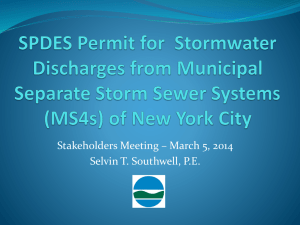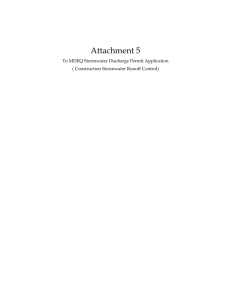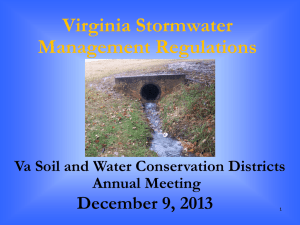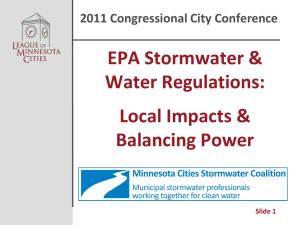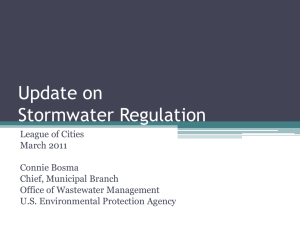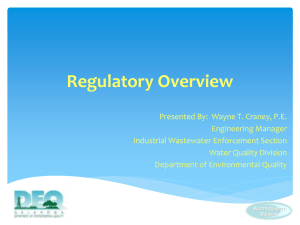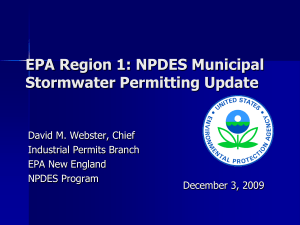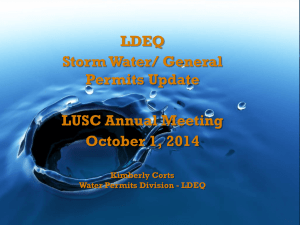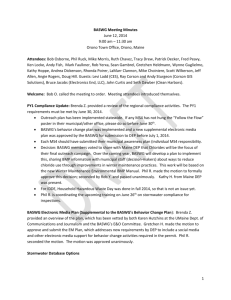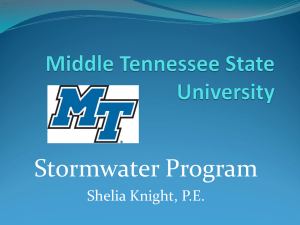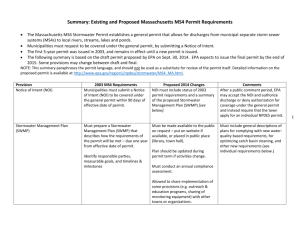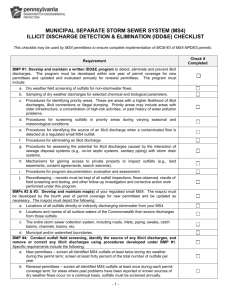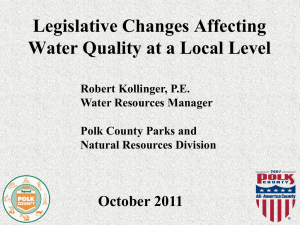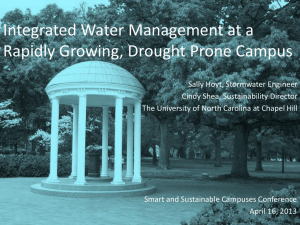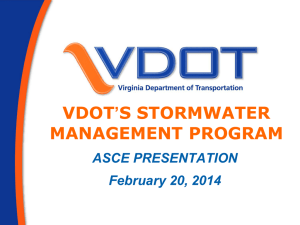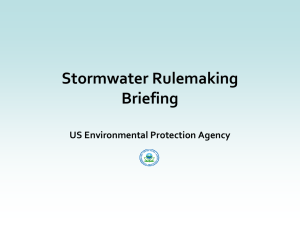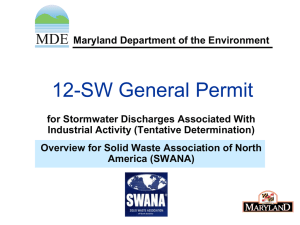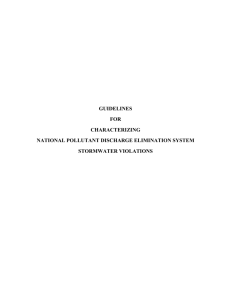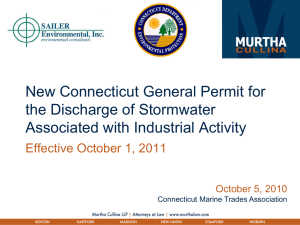Overview of the Draft Small MS4 General Permit
advertisement
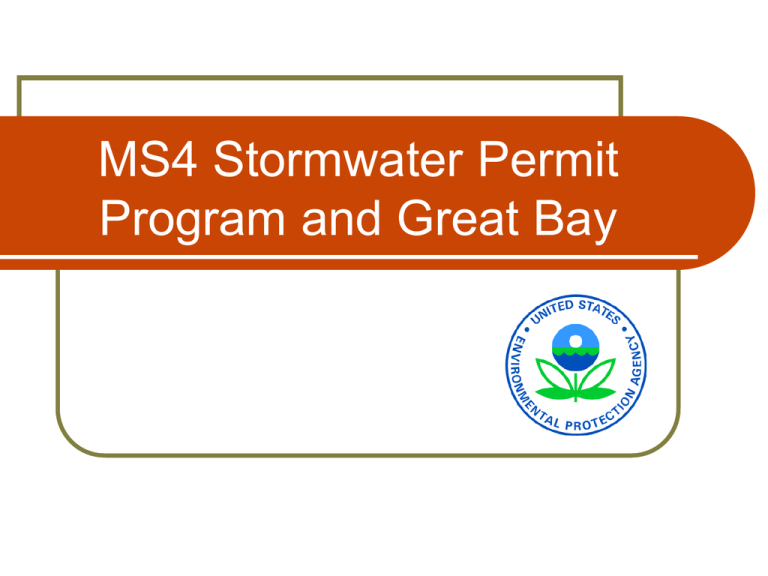
MS4 Stormwater Permit Program and Great Bay Brief Overview – EPA’s Stormwater Management Program Clean Water Act – NPDES - 1987 Stormwater amendments Two Phase approach to stormwater permitting Industrial activities Construction MS4s Phase II stormwater management program promulgated in 1999 Construction > 1 acre but less than 5 Small MS4s (population served < 100,000) 2003 - General Permit for Small MS4s in MA and NH issued 2008 – MS4-2003 expired, Draft Permit for NH MS4s public notice Final Permit expected early 2012 What is an MS4? A municipal separate storm sewer system is: A conveyance or system of conveyances owned by a state, city, town, or other public entity that discharges to waters of the U.S and is designed or used for collecting or conveying stormwater Includes roads with drainage systems, municipal streets, catch basins, curbs, gutters, ditches, man-made channels, or storm drains Does not include Combined sewers Parts of publicly owned treatment works Private systems Summary of NH MS4 permit issuance Phase II regulated MS4s are those located in an urbanized area as defined by the latest Census NH Phase II regulated MS4s: 38 Traditional, 4 Nontraditional, 7 Waivers 2003 Small MS4 GP covered regulated small MS4s in MA and NH, expired 2008 (administratively continued) Draft NH Small MS4 General Permit issued for public notice 2008. MA versions issued in 2010 and 2011 Final Permit issuance expected early 2012 with spring 2012 effective date Regulated MS4s in Great Bay Watershed Phase II regulated MS4s are those located in an “urbanized area” (Census definition) Great Bay watershed MS4s: Brentwood* Chester* Danville Dover Durham East Kingston* Exeter Greenland Hampstead Hampton Falls* Kingston Lee* Madbury* Milton Newington* North Hampton Portsmouth Rochester Rollinsford Sandown Somersworth NH DOT Strafford County Commissioners UNH * waiver under MS4-2003 MS4 Permit Structure Technology standard: reduce discharge of pollutants to the “Maximum Extent Practicable” Implemented through requirements for six “minimum control measures” Public education and outreach Public participation Illicit discharge detection and elimination Construction stormwater management Post-construction (development/redevelopment) Municipal good housekeeping/pollution prevention Water Quality based requirements & TMDLs MS4 Implementation Stormwater Management Program (SWMP) “Best management practices” (BMPs) to implement six minimum controls and water quality based requirements Annual assessment and reporting Reports available on EPA website http://www.epa.gov/region1/npdes/stormwater/2003-permit-archives.html Public Education and Outreach 2003- General program requirement Draft reissuance Specific audiences for education Specific education topics Specific number of educational messages Evaluation of the effectiveness of educational messages Illicit Discharge Detection and Elimination (IDDE) Program 2003 permit: ordinance/regulatory mechanism, outfall map, establish procedures Draft reissuance: Complete system map More specific requirements for: Assessment of MS4 for illicit discharge potential Systematic procedure for locating and removing illicit connections, includes outfall inventory & monitoring Prevent illicit discharges and SSOs Track program success Annual employee training Sampling/monitoring Construction 2003 Permit –Ordinance/ regulatory mechanism Draft reissuance Site plan review process Site inspections and enforcement Education Post-Construction 2003 Permit – Ordinance/ regulatory mechanism covering new development and redevelopment Draft reissuance Regulatory program requirements for plan review, design criteria (1” capture), BMP maintenance requirements Assessment of street design to support low impact development Assessment of regulations to allow green infrastructure practices Tracking impervious areas (IA) and implement efforts to reduce IA www.cwp.org Good House Keeping 2003 Permit - Develop a written program to prevent/reduce stormwater pollution from municipal activities and facilities Draft reissuance Standard operating procedures – parks, buildings, vehicles, and roads Specific infrastructure maintenance requirements Stormwater Pollution Prevention Plans (SWPPP) for maintenance garages and waste handling facilities Facility inspections Employee training Water Quality Requirements TMDLs Specific applicable BMPs identified Discharges to Impaired Waters BMPs addressing pollutant of concern to be included in SWMP Nitrogen Reduction Potential through MS4 Requirements Target minimum Controls relevant to N reduction Education – fertilizer use, septic system maintenance IDDE – illicit discharges are potentially large source of nitrogen loads Post-Construction – require stormwater management effective in control of N, LID Good House Keeping – fertilizer use, infrastructure maintenance Water Quality based requirements – Final permit to include specific N requirements for Great Bay watershed Questions? Susan Murphy U.S. Environmental Protection Agency Murphy.Susan@epa.gov (617) 918-1534
